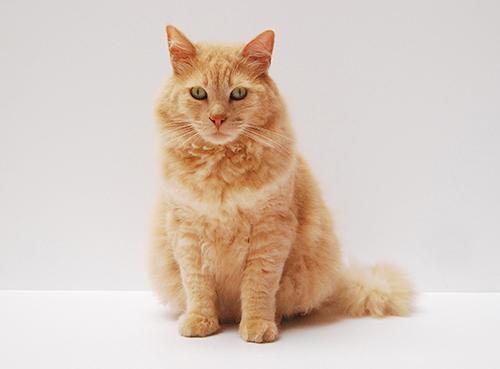
Hyperthyroidism in Cats
Thursday, March 1, 2018
According to petMD, there is no known genetic predisposition for hyperthyroidism or excess thyroid hormone in cats. However, it is quite common.
Hyperthyroidism is the most common hormonal (endocrine) disease in cats. It is often seen in late middle-aged and older cats. The mean age of discovery is approximately 13 years, with a range of 4 to 22 years old.
Thyroid hormones normally increase chemical processes occurring within the cells of the body, especially those related to metabolism. However, in hyperthyroidism, the excessive hormone levels result in increased metabolism with concurrent weight loss, increased appetite and diarrhea, among other symptoms.
Common symptoms include increased appetite, weight loss, unkempt appearance, poor body condition, vomiting, diarrhea, increased thirst, increased urine and rapid breathing to name a few.
The signs of feline hyperthyroidism can overlap with those of chronic kidney disease, diabetes, and cancer, especially intestinal lymphoma. A diagnosis of hyperthyroidism can usually be obtained with routine laboratory testing and thyroid function testing.
A high concentration of T4 (tetraiodothyronine) in the blood serum is the most common finding and confirms the diagnosis.
Outpatient treatment may be sufficient, if drugs that inhibit the production of thyroid hormones can be used.
Medications like methimazole can be given orally or applied to the ear and absorbed through the skin. This drug blocks the production of thyroid hormone. It can be administered long term and is generally well tolerated in most patients.
Hill’s Science Diet makes a hyperthyroid diet that is significantly reduced in iodine. Without iodine the thyroid is unable to produce thyroid hormone. This form of therapy is effective ONLY if the patient eats this diet exclusively.
Treats or other food sources contain enough iodine to allow the thyroid to continue to produce hormone. Dairy products and fish contain large amounts of iodine and should be avoided in cats being fed this iodine restricted diet as part of their management for hyperthyroidism.
Treatment using a radioactive form of iodine, will require inpatient treatment and monitoring.
Iodine is selectively taken up by the thyroid gland and incorporated into thyroid hormone. By administering a radioactive iodine, the overactive thyroid cells take in large amounts of radiation, which causes them to die.
This form of therapy is the preferred treatment because only the hyperactive thyroid cells are targeted. The normal thyroid cells should not absorb the radioactive iodine and will be spared.
The use of radioiodine is restricted to a medical facility since the treatment itself is radioactive. Depending on the guidelines in place in your area, your cat will need to be hospitalized from several days to a few weeks after treatment with radioactive medicine. This allows the radioactive material to clear most of the body before the cat is handled by family members.
Even after your cat returns home, precautions will still need to be taken to reduce the risk of having a toxic reaction to the radioactive treatment. Your veterinarian will advise you on any necessary precautions.
Untreated hyperthyroidism can lead to congestive heart failure. Poor absorption of nutrients and high metabolism in untreated hyperthyroidism suggest the need for a high protein, highly digestible diet.
Depending on the treatment strategy, your veterinarian will need to reexamine your cat every two to three weeks for the initial three months of treatment. This will include a complete blood count check for serum thyroid hormone concentration of T4. Medication dosages will be adjusted to maintain T4 concentration in the low to normal range.
In summary, hyperthyroidism is a common disease of older cats. Early diagnosis, effective treatment, and appropriate monitoring will enhance your cat’s life. Talk with your veterinarian about regular checkups for your cat and what you can do to keep your cat healthy.
by Elisabeth J. Giedt, DVM
Veterinary Viewpoints is provided by the faculty of the OSU Veterinary Medical Hospital. Certified by the American Animal Hospital Association, the hospital is open to the public providing routine and specialized care for all species and 24-hour emergency care, 365 days a year.
